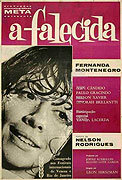
Ohjaus:
Leon HirszmanKäsikirjoitus:
Eduardo CoutinhoNäyttelijät:
Fernanda Montenegro, José Wilker, Billy Davis, Joel Barcellos, Nelson Xavier, Eduardo CoutinhoArvostelut (1)
How to liberate the suffering when suffering is the means to fulfill their desires – Hirszman performs a cut into the morality of the Brazilian petite bourgeoisie, in which the struggle of the favelas and poverty against the external/class enemy is replaced by the internal struggle of the declining petit bourgeois against themselves. The wife, representing a model hysterical structure in which there is a constant shifting of her own life dissatisfaction onto new objects, finds her complement in the husband's inability not only to find work but to not even look for work: any real resistance á la traditional cinema novo is inconceivable for the protagonists who enjoy their own satisfaction in privacy. As the film (and probably its literary source) brilliantly shows, the symbolic and intellectual horizon of the protagonists does not go beyond the framework of their class, which lacks the abundance of the upper society and the radicalism of the low classes' poverty, and therefore they need to never have too little but also not too much - the closer that power is, the more internal sabotage occurs (abandoning a lover, squandering easily earned money, etc.). The cornerstone of the work's construction is that it is precisely this view of their class, which regulates and motivates the actions of the main protagonists, that is visibly personified in the character of Glorinha, a wealthier relative – her omnipresence in the field of the protagonists' internal motivation is balanced precisely by her factual absence.
()